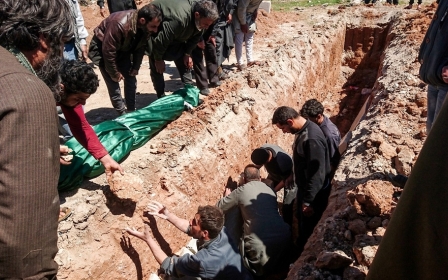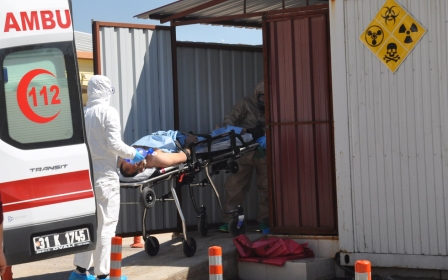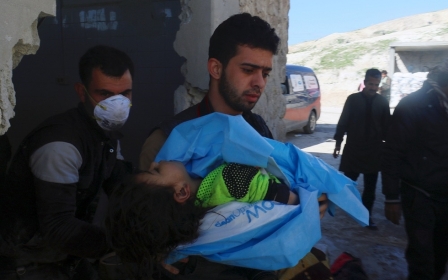US dismisses Russia blaming rebels for Syria gas attack
US officials dismissed an assertion by Russia on Wednesday that Syrian rebels were to blame for a suspected sarin gas attack rather than President Bashar al-Assad's government, and signalled possible unilateral action over what President Donald Trump called an "affront to humanity".
The US president said the attack "crossed a lot of lines," when asked if it did, in reference to his predecessor Barack Obama's threat to topple Assad with air strikes if he used such arms. It was not clear what, if any, action Trump would take.
The comments, which came just a few days after Washington said US diplomatic policy on Syria was no longer focused on making Assad leave power, widened a rift between the Kremlin and Trump's White House after initial signals of warmer ties.
Western countries, including the United States, blamed Syrian government forces for the worst chemical attack in Syria in more than four years, which choked scores of people to death in the town of Khan Sheikhoun in a rebel-held area on Tuesday.
US intelligence officials, based on a preliminary assessment, think the deaths were most likely caused by sarin nerve gas dropped by Syrian aircraft.
But Moscow offered an alternative explanation: that the poison gas belonged to rebels and had leaked from an insurgent weapons depot hit by Syrian bombs.
A senior White House official, speaking on condition of anonymity, said the Russian explanation was not credible. "We don't believe it," the official said.
The United States, Britain and France have proposed a draft UN Security Council resolution that would pin the blame on Damascus.
The Russian Foreign Ministry called the resolution "unacceptable" and said it was based on "fake information". Kremlin spokesman Dmitry Peskov said Moscow would press its case blaming the rebels for the poisoning, signalling a likely veto.
'All options on the table'
The US ambassador to the United Nations, Nikki Haley, issued what appeared to be a threat of unilateral action if Security Council members could not agree.
"When the United Nations consistently fails in its duty to act collectively, there are times in the life of states that we are compelled to take our own action," Nikki Haley told the council, without elaborating.
Trump described the attack as "horrible" and "unspeakable" and called it a "terrible affront to humanity". Asked whether he was formulating a new policy toward Syria, he told reporters: "You'll see."
US Vice President Mike Pence said on Wednesday that "all options are on the table" for a US response.
Pence also said in an interview with Fox News that Russia must fulfil its obligation under the 2013 agreement to eliminate chemical weapons from Syria.
Video uploaded to social media showed civilians sprawled on the ground, some in convulsions, others lifeless. Rescue workers hose down the limp bodies of small children, trying to wash away chemicals. People wail and pound on the chests of victims.
The charity Medecins Sans Frontieres said one of its hospitals in Syria had treated patients "with symptoms - dilated pupils, muscle spasms, involuntary defecation - consistent with exposure to neuro-toxic agents such as sarin". The World Health Organisation also said the symptoms were consistent with exposure to a nerve agent.
Turkish President Tayyip Erdogan said the attack had killed more than 100 people. That death toll could not be independently confirmed.
"We're talking about war crimes," French UN Ambassador Francois Delattre told reporters in New York.
Russian claim 'a lie'
Hasan Haj Ali, commander of the Free Idlib Army rebel group, called the Russian statement blaming the rebels a "lie" and said rebels did not have the capability to produce nerve gas.
"Everyone saw the plane while it was bombing with gas," he told Reuters from northwestern Syria. "Likewise, all the civilians in the area know that there are no military positions there, or places for the manufacture [of weapons]."
The incident is the first time Washington has accused Assad of using sarin since 2013, when hundreds of people died in an attack on a Damascus suburb. At the time, Washington said Assad had crossed a "red line" set by then-President Obama.
Obama threatened an air campaign to topple Assad but called it off at the last minute after the Syrian leader agreed to give up his chemical arsenal under a deal brokered by Moscow, a decision which Trump had said proved Obama's weakness. At the time, however, Trump opposed air strikes.
The current draft UN Security Council statement condemns the attack and demands an investigation. Russia has the power to veto it, which it has done to block all previous resolutions that would harm Assad, most recently in February.
France's foreign minister said the chemical attack showed Assad was testing whether the new US administration would stand by Obama-era demands that he be removed from power.
"It's a test. That's why France repeats the messages, notably to the Americans, to clarify their position," Jean-Marc Ayrault told RTL radio. "I told them that we need clarity. What's your position?"
Trump's response to a diplomatic confrontation with Moscow will be closely watched at home because of accusations by his political opponents that he is too supportive of Russian President Vladimir Putin.
US intelligence agencies say Russia intervened in the US presidential election last year through computer hacking to help Trump defeat Democratic candidate Hillary Clinton. The FBI and two congressional committees are investigating whether figures from the Trump campaign colluded with Moscow, which the White House denies.
Middle East Eye propose une couverture et une analyse indépendantes et incomparables du Moyen-Orient, de l’Afrique du Nord et d’autres régions du monde. Pour en savoir plus sur la reprise de ce contenu et les frais qui s’appliquent, veuillez remplir ce formulaire [en anglais]. Pour en savoir plus sur MEE, cliquez ici [en anglais].




